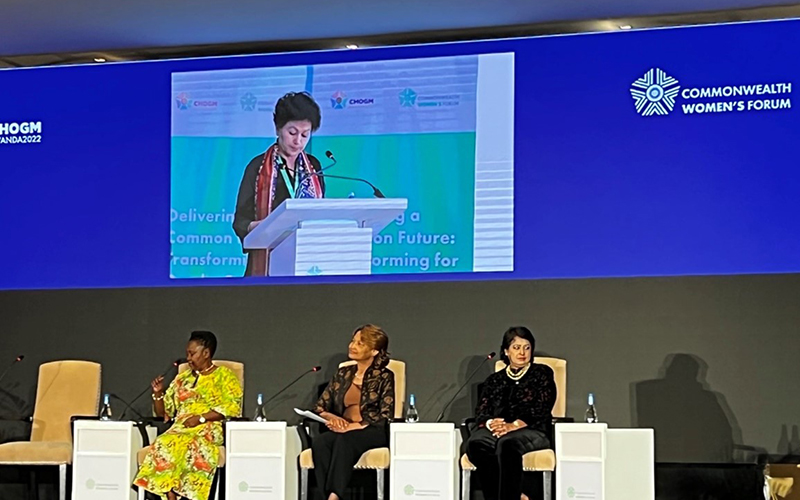
COL President Professor Asha Kanwar moderated a session at the Commonwealth Women’s Forum being held in Kigali, Rwanda to bring together voices from eminent persons to address human capital development from a digital and gender lens and to identify the skills and opportunities for women needed to participate in an increasing digital world.
Professor Kanwar provided an introduction to COL’s work which makes use of technology to provide greater access to learning opportunities, especially for women and girls. Learning for sustainable development is at the centre of what COL does and women’s empowerment and gender equality are an essential component. A number of initiatives are designed to support girls so they do not drop out of school—for example, the Open Schooling initiative provides flexibility to learners and is delivered at a lower cost than traditional schooling. The Coursera Workforce Recovery Program offered during the pandemic provided free online access to a range of courses for skills for livelihoods. The Lifelong Learning for Farmers initiative leverages the basic mobile phone to deliver audio-based MOOCs to scale learning for women farmers in financial and digital literacy as well as entrepreneurship. A mentorship programme for young women in remote areas was set up to build their leadership skills.
The panellists – Dr Ameenah Gurib-Fakim, Former President of the Republic of Mauritius; Ms Bernadette Lewis, Secretary General of Commonwealth Telecommunications Trust; Ms Goretti Kyomuhendo, Author and Director of the African Writers Trust; and Dr Diane Karusisi, CEO, Bank of Kigali – were invited to share their insights on whether ICT skills alone were sufficient for empowering women, what skills were necessary to empower women to be prepared for an increasingly changing and dynamic work environment and what educational opportunities are available for women and girls to excel in technology and other digital sectors.
Some insights emerged during the discussion. Education by far was recognised as the most important tool to address the gender gaps. Technology has penetrated all spheres of life and digital literacy is critical for accessing services which are now available online. It must be introduced from an early age. Role models matter and stereotypes of what girls can and cannot do must be broken. Provision of access to technologies should be a collective responsibility – governments, service providers in the private sector – with partnerships key as no one group can do it alone. Policies should start with the last mile for inclusion of the most marginalised. Empowering women is a collective responsibility where employers must put more women in power by providing them with more learning opportunities. The importance of evidence-based advocacy was highlighted to influence and catalyse change where sex-disaggregated data in usable and accessible formats was needed. And last, but not least was capturing the tacit and indigenous knowledge in written format so that it was not lost to future generations.
With the use of technology serious barriers have come up such as cyberbullying, body shaming. Gender-based violence was also a concern. A targeted approach to addressing these barriers is needed.


